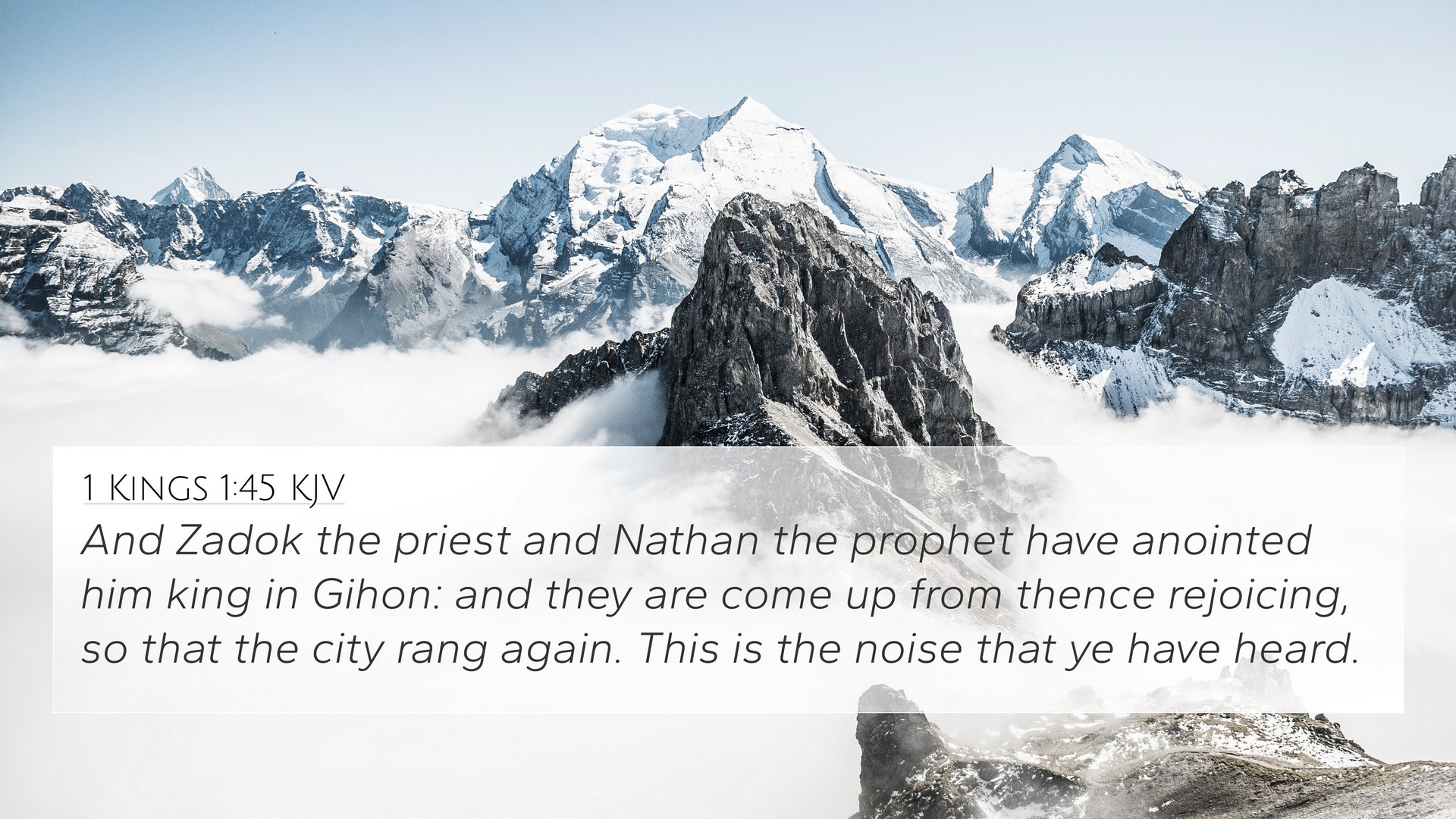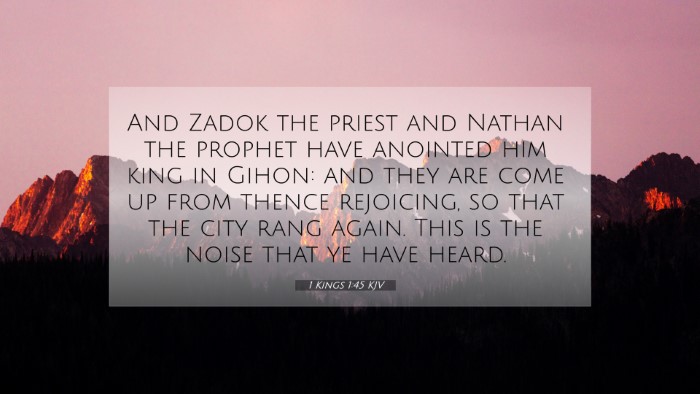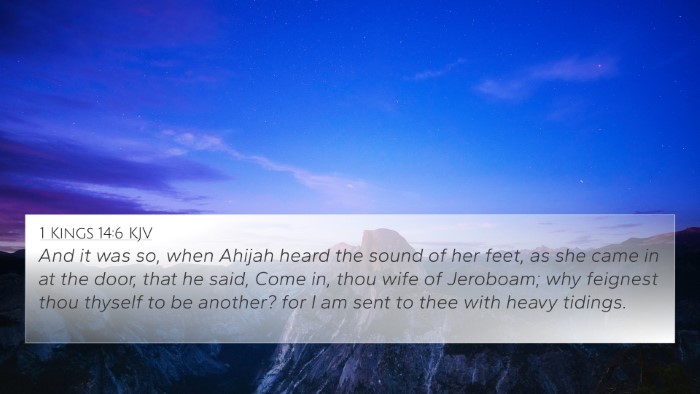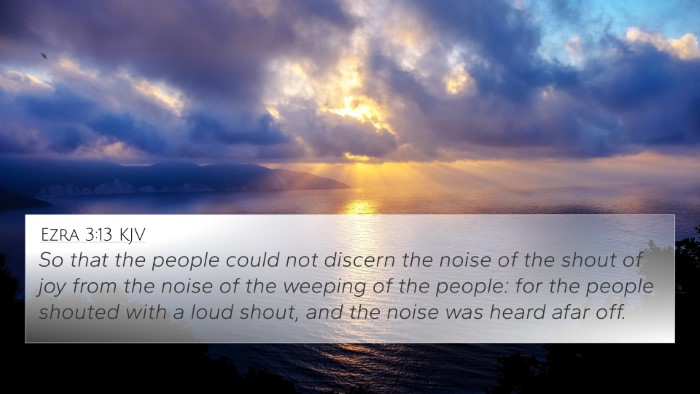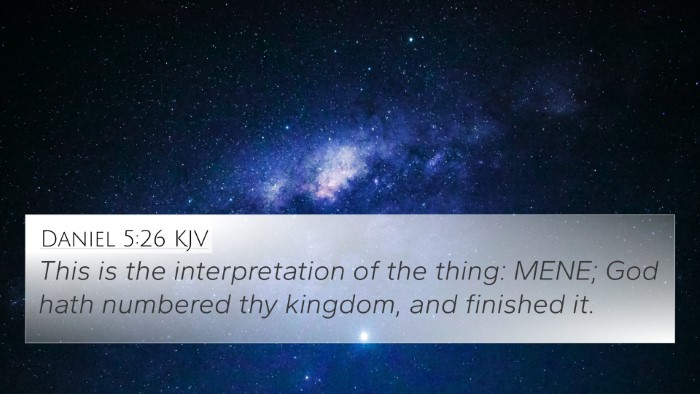Understanding 1 Kings 1:45
1 Kings 1:45 states: "And Zadok the priest took a horn of oil out of the tabernacle, and anointed Solomon. And they blew the trumpet; and all the people said, God save king Solomon."
Verse Meaning and Context
The anointing of Solomon by Zadok signifies the official declaration of Solomon as King of Israel. This act not only fulfills God's promise of succession through David's line but also signifies the important role of the priesthood in the monarchy.
In the context of this event, Solomon's appointment is met with great acclaim from the people, demonstrating a united national support for his kingship, contrasting the rival claims of Adonijah, who had attempted to seize the throne earlier.
Insights from Commentaries
- Matthew Henry: Emphasizes the importance of the anointing as a divine appointment and highlights the distinction between God's chosen leader and the self-appointed rulers.
- Albert Barnes: Notes that this event marks a pivotal moment in fulfilling God’s covenant with David regarding his lineage and the establishment of a dynasty that would include future Messianic prophecies.
- Adam Clarke: Points out the significance of the horn of oil used for anointing, which symbolizes strength and the Holy Spirit, and ties it to the broader biblical theme of anointing kings as a divine endorsement.
Key Themes and Connections
This verse reflects several critical themes within the broader biblical narrative:
- The Divine Right of Kings: The acknowledgment of God's sovereignty in choosing a leader (Psalm 75:6-7).
- The Role of the Priesthood: Zadok's involvement emphasizes the interconnectedness of religious and political authority (Hebrews 7:14).
- The Importance of Public Acclamation: The people's response showcases their recognition of Solomon's legitimacy (1 Samuel 10:24).
Cross-References and Related Verses
1 Kings 1:45 can be connected to several other scripture passages to enhance understanding:
- 1 Samuel 16:13: Samuel anointing David, paralleling Solomon's anointing.
- 2 Samuel 5:3: The anointing of David as king over all Israel.
- 1 Kings 2:4: Assurance of David's house enduring before the Lord.
- 2 Chronicles 23:11: The anointing of Joash as king amidst a similar context of political strife.
- Psalms 2:6: Prophetic affirmation of God's chosen king.
- Isaiah 11:1: The coming of a future king from the line of Jesse, linking to the Messianic prophecy.
- Matthew 3:16-17: Jesus' baptism as an anointing for His messianic mission.
Bible Study and Cross-Referencing Tools
When studying scriptures such as 1 Kings 1:45, the following tools can be beneficial:
- Bible Concordance: Useful for finding related verses and themes.
- Bible Cross-Reference Guide: A helpful tool to link verses across the Bible based on themes.
- Cross-Reference Bible Study Methods: Techniques that enhance your understanding of biblical relationships.
- Bible Reference Resources: Compilations that help in identifying thematic connections.
- Bible Chain References: A method to study Scripture by following verse connections.
Exploring Inter-Biblical Dialogues
The anointing of Solomon reflects ongoing dialogues throughout scripture regarding kingship, leadership, and God's chosen instruments for governance:
- How do 1 Kings connect with the Gospels? Both reflect God's sovereign choice in leaders.
- Details of the cross-references between Samuel, Kings, and Psalms strengthen our understanding of God’s plan.
- Connections between the prophetic voices in the Old Testament and the New Testament reveal the consistency of God's purpose.
Conclusion
Understanding 1 Kings 1:45 involves recognizing the importance of anointing as a theological and practical symbol of God's selection. The interplay between the anointed king, the priestly office, and the people's response reveals much about leadership in biblical history and continues to resonate in our understanding of divine authority today.
